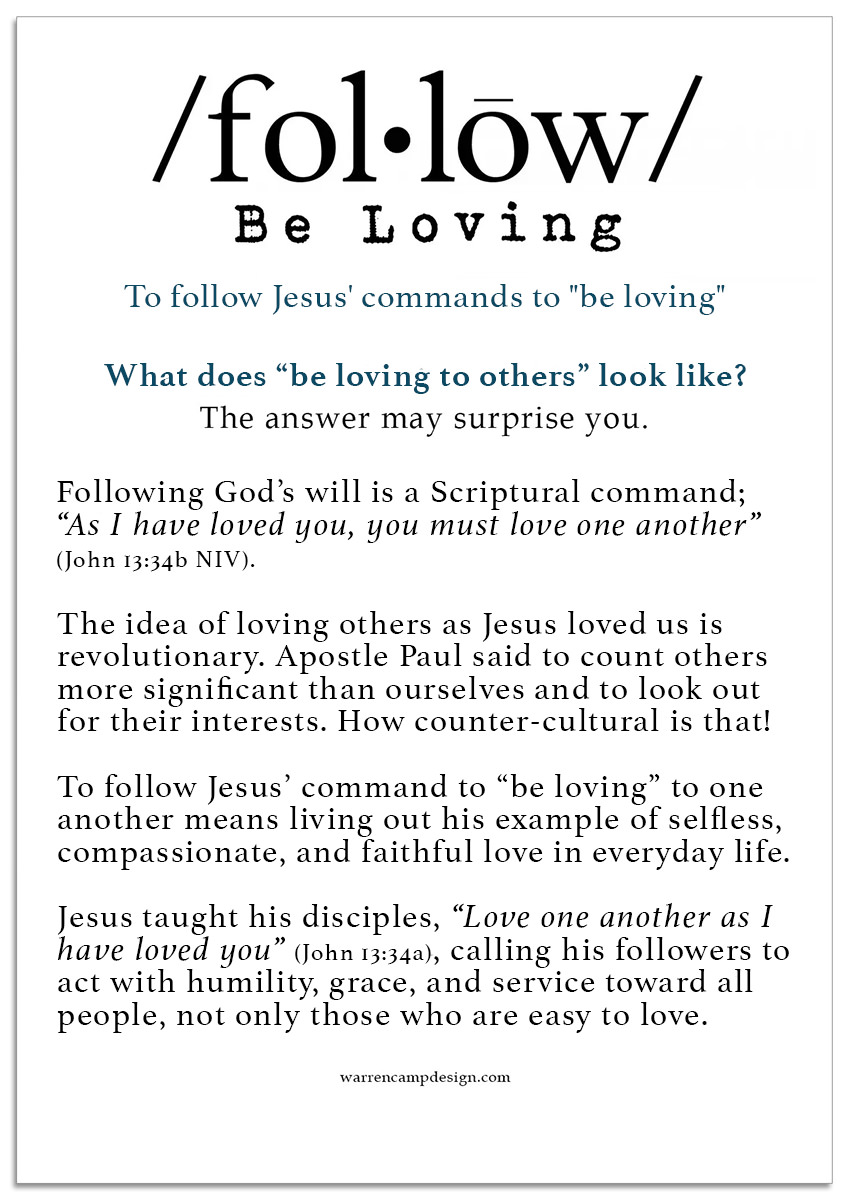Apostle John’s Three Letters . . . 1 John 4:7–11
The Meaning of Love
Last week's study focused on Apostle John's six-verse passage about "discernment," the quality of being able to grasp and comprehend the obscure; the ability to distinguish truth. Spiritual discernment is a Spirit-endowed gift, the ability to tell the difference between truth and fallacy. It's basic to having wisdom.
The Elder immediately follows with a discourse on "God's Love and Ours." The natural product of being a true child of God is that we no longer live under the spirit of fear but of Sonship. As we discovered in our reading of 1:1–7, true believers are sons of Father God who are known by their love of Jesus and their love for one another. Love is from God because he is love. Anyone who claims to love God is to also love his brother and sister. A failure to love them proves that he or she doesn't know God. Clearly, the world doesn't know love because it doesn't know God.
John emphasized the value and importance of love in 2:7–11, in 3:11–18, 23, and in 4:7–5:3. He wanted to drive home the "Love God and and love one another" point so that his readers understood that that was a requirement for believers. Emphatically, he wrote: "Whoever does not love does not know God, because God is love" (4:8). We're obliged, therefore, by Apostle John and Jesus, to evaluate our life to determine how to make it comply with this supreme "love" standard.
Love Comes from God Alone (1 John 4:7–8)
Before we read the text, realize that, although born-again believers inevitably receive God's love, they don't automatically receive it. They must "know God," at which point his love is displayed in them, enabling them to love others. For those of us who are Father God's children, because his divine nature is built upon loving one another, he commands us to become like him by loving our brothers and sisters (v. 11). Naturally, we expect children to take on their parents' characteristics. Those of us who truly know Father God — who is love — and are his children, are able and bound to flourish in love. But those who don't love don't know God.
Is there someone in your life you're struggling to love? Is there a person for whom, despite your best intentions, it seems impossible to summon any affection? Knowing that we should love doesn't automatically enable us to succeed. However, there's good news: For Christians, God makes it possible to love others by providing the indwelt Spirit of Jesus who pours his love into our hearts (Romans 5:5).
God’s Love and Ours
7Dear friends, let us love one another, for love comes from God. Everyone who loves has been born of God and knows God. 8Whoever does not love does not know God, because God is love (4:7–8).
The Elder's opening verse introduces a new topic that he'll set forth throughout the remainder of the chapter. It's the topic he discusses at length more than any other: "Love." Being "the disciple whom Jesus loved," John obviously shared a deep affection of and with Lord Jesus. When he writes "for love comes from God," he emphasizes that true love originates in God as a gift from him, revealing that we have his Spirit in us and are to become more like him than we can imagine. Jealousy, hatred, envy, displeasure, malevolence, and so on all originate from worldly drives and priorities; they don't come from God and he doesn't approve of or endorse them.
What a relief to know that such love is a gift from God, not something we're to produce. And our Lord doesn't give us commands without providing that which our obedience requires. When we trust Christ as Savior, we receive not only forgiveness of our sins and adoption into Father God's family, we also receive the ability to "love one another" as he does. His love, in fact, is evidence that we're born of God and we know him (v. 7). When we submit to his will and way, his life is displayed in us through our selfless, sacrificial support for others.
Obviously, without a sense of purpose, there's no hope! But the Lord created each person for a reason: to love God and be loved by him. He pursues us and does everything in his infinite power to reveal himself. He wants each person to understand who he is; we're then to respond in worship and devotion. God's love is personal, unconditional, and available to everyone. Father God didn't just declare that he loves us; he proved it by giving his Son as a sacrifice for sin. Those who haven't trusted in Savior Jesus can go through life ignorant of his unconditional care blessing. But what a waste it would be to live as "unloved" when God's infinite, eternal love is accessible for all.
We've found in 2:9–11 and 3:10–18 John’s persuasive emphasis on loving the people of Father God. In v. 7, we learn why it's critical for Christians to love their brothers and sisters. If "love comes from God," then those who claim to be "born of God" and to "know God" must continually make a sincere effort to "love one another" who are members of God's body. A brand-new capacity to truly be loving and love others is made possible in believers' lives after they become born anew by the Spirit of Jesus.
While Jesus commands all His followers to love everyone as their “neighbor,” he gives an additional, deeper command concerning love among believers — a kind of family love that reflects the unity of God’s people and displays his character to the world. Let’s look carefully at what Scripture says about this specific command that we're to follow:
- A New Commandment, John 13:34–35: This “new” commandment deepens the old “love your neighbor” command (Leviticus 19:18). Love among believers is meant to be the visible mark of true discipleship.
- The Command Repeated Often The early church took this command seriously. You see it echoed throughout the New Testament: John 15:12–13; Romans 12:10; 1 Thessalonians 4:9; 1 Peter 1:22.
- Why Jesus' Command to Love Others matters: It proves our relationship with Christ (John 13:35); it sustains unity within the body (Ephesians 4:2–3); it nurtures growth and healing among believers (Colossians 3:12–14); and it attracts unbelievers who witness genuine love within the church (Acts 2:42–47).
- Reflection and Prayer: To love fellow believers is to practice heaven’s culture on earth. It’s how the church becomes a living picture of Christ’s compassion and unity. When we love one another well — especially when it’s difficult — we display the supernatural love of God Himself.
The type of love that John writes of is derived from the ancient Greek word agape, which gotquestions.org defines as ". . . always shown by what it does. God’s love is displayed most clearly at the cross. . . God’s agape love is unmerited, gracious, and constantly seeking the benefit of the ones He loves." It's a self-giving type of love that gives without any expectation of reimbursement or compensation — it's God's divine kind of love.
Verse 7b's "Everyone who loves has been born of God and knows God" speaks of a renewed, true-Christian person who possesses and actively shares true brotherly love of Christians. Although a person may show considerable natural affection towards people, especially the poor and needy, he or she might lack that special "born of God love" to which John refers in v.7. The Greek for "knows" in the phrase "and knows God" (v. 7b) is ginosko, which is to "experience, undergo, encounter." According to the Elder, when we experience God we'll have the ability to genuinely demonstrate our love for one another.
John goes on to say in v. 8 "Whoever does not love does not know God, because God is love." He submits to his dear friends that God is the source of genuine love; such loves originates from God's unique nature. But if they have no love in their hearts, they can't pretend to be like him and be a child of his. Why not? John's answer is short but direct: "because God is love." John isn't suggesting that only Christians are able to truly display acts of love. People throughout the world can actively express love for others.
American theologian Albert Barnes (1798–1870) wrote this about "God Is Love" in his Notes on the New Testament: "Never was a more important declaration made than this; never was more meaning crowded into a few words than in this short sentence — God is love. In the darkness of this world of sin . . . we have the assurance that a God of infinite benevolence rules over all. In the midst of all that occurs on the earth (sadness, sin, and sorrow), there are abundant evidences that God is love. Even in this world of confusion, disorder, and darkness, we have evidence sufficient to prove that he is benevolent, but the full glory and meaning of that truth will be seen only in heaven. Meantime let us hold on to the truth that he is love. Let us believe that he sincerely desires our good, and that what seems dark to us may be designed for our welfare; and amidst all the sorrows and disappointments of the present life, let us feel that our interests and our destiny are in the hands of the God of love."
Those who don't know God live the sort of live that serves other gods: certainly the devil, as well as themselves. God loved his children so much, then and now, that he allowed his only Son to come to earth to be rejected by man, thereafter undergoing a humiliating, public, lonely death on a cross, solely for the purpose of paying his children's sin debt. Realizing the extent of all he'd endured and accomplished on our behalf, how much more love can we receive than that?
How God Showed His Love Among Us (4:9–11)
9This is how God showed his love among us: He sent his one and only Son into the world that we might live through him. 10 This is love: not that we loved God, but that he loved us and sent his Son as an atoning sacrifice for our sins. 11Dear friends, since God so loved us, we also ought to love one another (4:9–11).
John tells us in v. 9a how God demonstrated his true love for his children when he wrote: "He sent his one and only Son into the world." That ought to remind us of what the Elder had written previously in his gospel account (John 3:16). God had big-hearted, compassionate feelings toward people of the world and sought to offer everyone the full extent of happiness. He hates evildoing yet still seeks the happiness of sinners.
John presents in v. 9 what love is and what it means to God's children. Love isn't defined only by Jesus' sacrifice (as revealed in First John 3:16; it's also defined by the Father's sacrifice to send his only Son to earth to suffer and die in judgment of our sinfulness. The special term "one and only" documents the fact that Jesus has a unique Sonship with Father God.
Verse 9b's "that we might live through him" directs our attention to the application aspect of this passage. Jesus died that we might have eternal life through the benefit of his sacrifice. It's in that eternity to which we'll inevitably go. Whether we become saved or lost, we'll have an ever-expanding view of the magnificent love of God.
John makes two points in vv. 9–10 about how we are to see God's love: (1) We see it in us by the fact that he sent his son to die on our account so we could live through him (v. 9), and (2) we see his love, not in how we love him but in his loving us and becoming "an atoning sacrifice [or the propitiation] for our sins" (v. 10). John's "This is love," emphasizes the way that love is a valuable, extraordinary gift of Father God. Regarding "that he loved us," we ought to feel and appreciate how much God loved us — not with the love of self-satisfaction, but with the love of warmheartedness. Finally, the Elder commands us again to "love one another." Unless we do this, we'll be unable to prove that we're his children.
Senior Pastor Steven J Cole writes this informative commentary about today's passage: "The connection between what John says in 4:1–6 and his abrupt change of subject in 4:7ff. stems from 3:23's: 'This is His commandment, that we believe in the name of His Son Jesus Christ, and love one another, just as He commanded us.' In 4:1–6, John explains the first part of that commandment, namely, believing in the name of His Son Jesus Christ. Now, he turns to the second part of the commandment, the need to love one another. He tells us why we must love one another. . . because God is love and He showed it by sending His Son as the propitiation for our sins. . .
"Implicit in what John is saying here is that we must love those who may not be especially lovable or easy to love. He states the commandment and gives the reason for it (4:7–8). Then he points us to the supreme illustration of love in the whole world, the Father’s love in sending His Son to die for our sins (4:9–10). Then he'll restate the commandment in light of God’s great love (4:11). He will go on to show how love for one another is evidence of God’s abiding in us and our abiding in Him (4:12–16). And, he'll show (4:17–21) that love for one another is evidence that we are mature in our love for God."
Closing Considerations (from Dr. Charles Stanley)
One of the biggest struggles many people face is a feeling that the Lord couldn't possibly love them. Yet, today's reading clearly tells us he does. Far from saying so with words, God has also given us ample proof: He sent his Son to redeem us from sin so that we could be forgiven and reconciled to God, and then live with him in heaven forever. Why then, with such evidence, do so many of us still doubt his love? [See and appreciate the truth of Jesus' desire to forgive our sins by watching this BibleProject video titled "Khata: Sin"]
Perhaps the reason is that we are looking at it from our own limited perspective: Since human beings cannot love unconditionally, we doubt that the Lord can. After all, worldly logic considers it reasonable to be loving towards people who measure up to our standards but to hold ourselves aloof from those who don't.
Or maybe we just feel unworthy of his love. Well, no one is worthy. God's love is based not on whether we are deserving but on his character — we need to understand that love isn't simply something God does; it's who he is (v.8). Divine love is a demonstration of God's commitment to our greatest good. It's like the ocean's tide. You can stand on the shore and say, "I don't believe in waves," but that doesn't stop the waves. Likewise, nothing you do or feel will stop the Father's love from washing over you.
- Q. 1 Was there someone in your life whom you struggled to love but were successful? What effort(s) made it possible?
- Q. 2 What would you say is the importance of v. 9 in your testimony to others? Why?
1 John 4:7–11
New International Version (NIV)
[View it in a different version by clicking here; also listen to chapter 4 narrated by Max McLean.]





